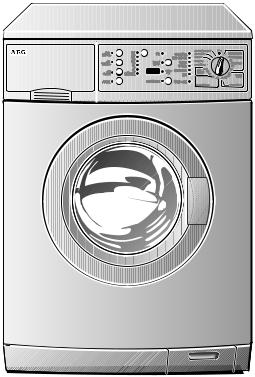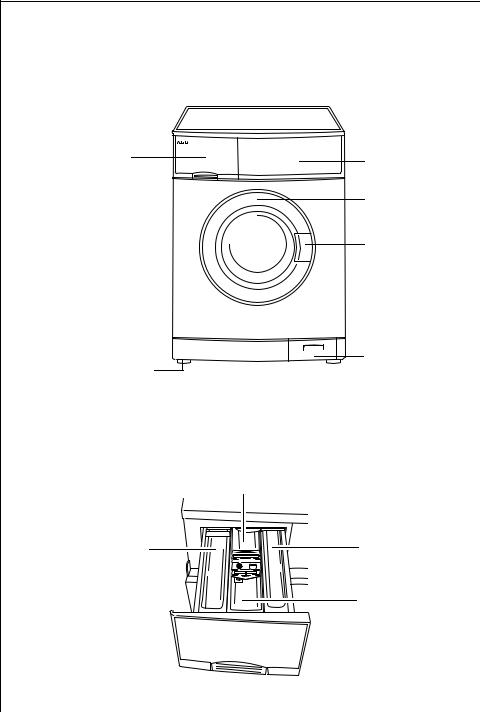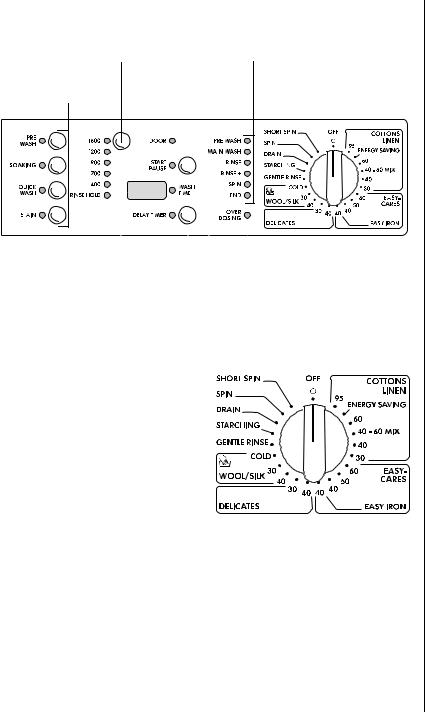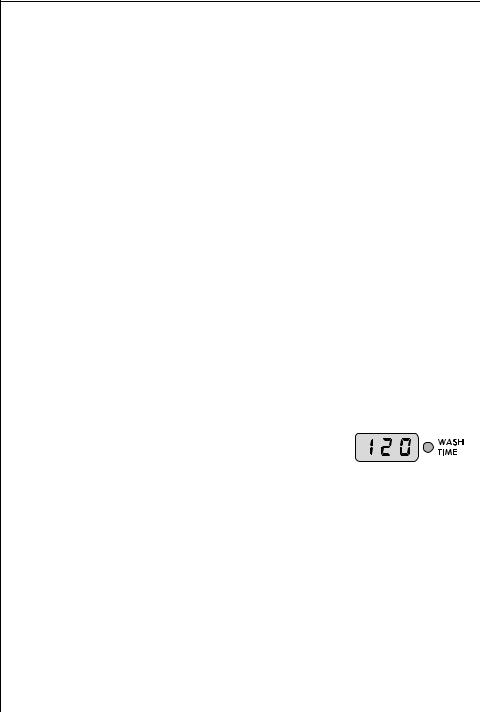AEG OKO-LAVAMAT 76760 User Manual

ÖKO-LAVAMAT 76760 update
The environmentally friendly washing machine
User information

Dear Customer,
Please read this user information carefully.
Pay particular attention to the section "Safety" on the first Info pages. Please keep this user information in a safe place for later reference. Pass it on to any future owners of the unit.
1 The warning triangle and /or signal words (Warning!, Caution!, Important!) emphasise information which is important for your safety or for the unit's functional reliability. It is imperative that this information is observed.
01. This symbol guides you step by step through the operation of the appliance.
|
2. ... |
3 |
Next to this symbol you will find additional information and practical |
|
tips on using the appliance. |
2 |
Tips and information on economical and environmentally responsible |
|
use of the unit are identified with the clover leaf. |
For any faults which occur, this user information contains information on how to remedy these faults yourself. See the section "What to do if ..."
Printed on recycled paper.
Thinking ecologically means acting ecologically.
2

Contents |
|
Operating Instructions . . . . . . . . . . . . . . . . . . . . . . . . . . . . . . . . . . . . |
6 |
Safety . . . . . . . . . . . . . . . . . . . . . . . . . . . . . . . . . . . . . . . . . . . . . . . . . . . . . . . . |
6 |
Disposal . . . . . . . . . . . . . . . . . . . . . . . . . . . . . . . . . . . . . . . . . . . . . . . . . . . . . . |
8 |
Environmental tips . . . . . . . . . . . . . . . . . . . . . . . . . . . . . . . . . . . . . . . . . . . . . |
9 |
Unit description . . . . . . . . . . . . . . . . . . . . . . . . . . . . . . . . . . . . . . . . . . . . . . . |
10 |
Front view . . . . . . . . . . . . . . . . . . . . . . . . . . . . . . . . . . . . . . . . . . . . . . . . . . . . |
10 |
Drawer for detergent and care agent . . . . . . . . . . . . . . . . . . . . . . . . . . . . . |
10 |
Control panel . . . . . . . . . . . . . . . . . . . . . . . . . . . . . . . . . . . . . . . . . . . . . . . . . . |
11 |
Program Selector . . . . . . . . . . . . . . . . . . . . . . . . . . . . . . . . . . . . . . . . . . . . |
11 |
Additional program buttons . . . . . . . . . . . . . . . . . . . . . . . . . . . . . . . . . . . |
13 |
Consumption values . . . . . . . . . . . . . . . . . . . . . . . . . . . . . . . . . . . . . . . . . . . |
14 |
Running time display . . . . . . . . . . . . . . . . . . . . . . . . . . . . . . . . . . . . . . . . . . . . |
14 |
What does "UPDATE“ mean? . . . . . . . . . . . . . . . . . . . . . . . . . . . . . . . . . . . . |
15 |
Water Protection Aqua Control . . . . . . . . . . . . . . . . . . . . . . . . . . . . . . . . . |
15 |
Before the First Wash . . . . . . . . . . . . . . . . . . . . . . . . . . . . . . . . . . . . . . . . . . |
15 |
Prepare washing cycle . . . . . . . . . . . . . . . . . . . . . . . . . . . . . . . . . . . . . . . . . . |
16 |
Sort washing and prepare . . . . . . . . . . . . . . . . . . . . . . . . . . . . . . . . . . . . . . . . |
16 |
Types of Washing and Care Symbols . . . . . . . . . . . . . . . . . . . . . . . . . . . . . . . |
17 |
Washing Detergents and Care Agents . . . . . . . . . . . . . . . . . . . . . . . . . . . . . . |
18 |
Which washing detergent and care agent? . . . . . . . . . . . . . . . . . . . . . . |
18 |
How much washing detergent and care agent? . . . . . . . . . . . . . . . . . . . |
18 |
Water softener . . . . . . . . . . . . . . . . . . . . . . . . . . . . . . . . . . . . . . . . . . . . . . . . . |
18 |
Run a washing cycle . . . . . . . . . . . . . . . . . . . . . . . . . . . . . . . . . . . . . . . . . . . |
19 |
Brief instructions . . . . . . . . . . . . . . . . . . . . . . . . . . . . . . . . . . . . . . . . . . . . . . . |
19 |
Setting the Washing Program . . . . . . . . . . . . . . . . . . . . . . . . . . . . . . . . . . . . |
20 |
Changing the spin speed/Selecting the rinse hold function . . . . . . . . . . . . |
21 |
Set the Delay Timer/Soaking Duration . . . . . . . . . . . . . . . . . . . . . . . . . . . . . |
21 |
Opening and Closing the Filling Door . . . . . . . . . . . . . . . . . . . . . . . . . . . . . . |
22 |
Add the washing . . . . . . . . . . . . . . . . . . . . . . . . . . . . . . . . . . . . . . . . . . . . . . . |
22 |
Add Washing Detergent/Care Agent . . . . . . . . . . . . . . . . . . . . . . . . . . . . . . . |
23 |
Starting the washing program . . . . . . . . . . . . . . . . . . . . . . . . . . . . . . . . . . . . |
24 |
Completion of the Washing Program . . . . . . . . . . . . . . . . . . . . . . . . . . . . . . |
25 |
Wash cycle complete/removing the washing . . . . . . . . . . . . . . . . . . . . . . . . |
26 |
3

Program tables . |
. . . . . . . . . . . . . . . . . . . . . . . . . . . . . . . . . . . . . . . . . . . . . . . |
28 |
Washing . . . . . . . |
. . . . . . . . . . . . . . . . . . . . . . . . . . . . . . . . . . . . . . . . . . . . . . . |
28 |
Separate conditioning/starching/impregnation . . . . . . . . . . . . . . . . . . . . . |
29 |
|
Separate rinse . . |
. . . . . . . . . . . . . . . . . . . . . . . . . . . . . . . . . . . . . . . . . . . . . . . |
29 |
Separate spin . . . . |
. . . . . . . . . . . . . . . . . . . . . . . . . . . . . . . . . . . . . . . . . . . . . . |
29 |
Cleaning and Care . . . . . . . . . . . . . . . . . . . . . . . . . . . . . . . . . . . . . . . . . . . . . |
30 |
|
Control panel . . . . |
. . . . . . . . . . . . . . . . . . . . . . . . . . . . . . . . . . . . . . . . . . . . . . |
30 |
Detergent Drawer |
. . . . . . . . . . . . . . . . . . . . . . . . . . . . . . . . . . . . . . . . . . . . . . |
30 |
Washing Drum . . . |
. . . . . . . . . . . . . . . . . . . . . . . . . . . . . . . . . . . . . . . . . . . . . . |
31 |
Main door . . . . . . . |
. . . . . . . . . . . . . . . . . . . . . . . . . . . . . . . . . . . . . . . . . . . . . . |
31 |
What to do if ... |
. . . . . . . . . . . . . . . . . . . . . . . . . . . . . . . . . . . . . . . . . . . . . . . |
32 |
Remedying Faults . |
. . . . . . . . . . . . . . . . . . . . . . . . . . . . . . . . . . . . . . . . . . . . . . |
32 |
If the washing results are not satisfactory . . . . . . . . . . . . . . . . . . . . . . . . . . |
36 |
|
Carrying out emergency drainage . . . . . . . . . . . . . . . . . . . . . . . . . . . . . . . . . |
37 |
|
Drain pump . . . . . . |
. . . . . . . . . . . . . . . . . . . . . . . . . . . . . . . . . . . . . . . . . . . . . . |
38 |
Additional rinsing cycle (RINSE+) . . . . . . . . . . . . . . . . . . . . . . . . . . . . . . . . . |
40 |
|
Water Cooling . . . |
. . . . . . . . . . . . . . . . . . . . . . . . . . . . . . . . . . . . . . . . . . . . . . |
41 |
Additional Rinse and Water Cooling . . . . . . . . . . . . . . . . . . . . . . . . . . . . . . . |
41 |
|
Child Safety Feature . . . . . . . . . . . . . . . . . . . . . . . . . . . . . . . . . . . . . . . . . . . |
42 |
|
Installation and connection instructions . . . . . . . . . . . . . . . . |
43 |
Installation Safety Precautions . . . . . . . . . . . . . . . . . . . . . . . . . . . . . . . . . . |
43 |
Installation of the appliance . . . . . . . . . . . . . . . . . . . . . . . . . . . . . . . . . . . . |
44 |
Transporting the appliance . . . . . . . . . . . . . . . . . . . . . . . . . . . . . . . . . . . . . . . |
44 |
Remove transport packaging . . . . . . . . . . . . . . . . . . . . . . . . . . . . . . . . . . . . . |
44 |
Prepare the installation place . . . . . . . . . . . . . . . . . . . . . . . . . . . . . . . . . . . . |
46 |
Installation on a concrete base . . . . . . . . . . . . . . . . . . . . . . . . . . . . . . . . |
46 |
Installation on vibrating floors . . . . . . . . . . . . . . . . . . . . . . . . . . . . . . . . . |
46 |
Compensate for floor unevenness . . . . . . . . . . . . . . . . . . . . . . . . . . . . . . . . . |
47 |
4

Electrical connection . . . . . . . . . . . . . . . . . . . . . . . . . . . . . . . . . . . . . . . . . . . |
48 |
Water connection . . . . . . . . . . . . . . . . . . . . . . . . . . . . . . . . . . . . . . . . . . . . . |
48 |
Permissible water pressure . . . . . . . . . . . . . . . . . . . . . . . . . . . . . . . . . . . . . . . |
48 |
Water inflow . . . . . . . . . . . . . . . . . . . . . . . . . . . . . . . . . . . . . . . . . . . . . . . . . . |
49 |
Water drain . . . . . . . . . . . . . . . . . . . . . . . . . . . . . . . . . . . . . . . . . . . . . . . . . . . |
50 |
Delivery heads over 1m . . . . . . . . . . . . . . . . . . . . . . . . . . . . . . . . . . . . . . . . . . |
50 |
Technical data . . . . . . . . . . . . . . . . . . . . . . . . . . . . . . . . . . . . . . . . . . . . . . . . |
51 |
Dimensions . . . . . . . . . . . . . . . . . . . . . . . . . . . . . . . . . . . . . . . . . . . . . . . . . . |
51 |
Warranty conditions / Customer service centres . . . . . . . |
52 |
Index . . . . . . . . . . . . . . . . . . . . . . . . . . . . . . . . . . . . . . . . . . . . . . . . . . . . . . . . |
58 |
Service . . . . . . . . . . . . . . . . . . . . . . . . . . . . . . . . . . . . . . . . . . . . . . . . . . . . . . |
59 |
5

Operating Instructions
Operating Instructions
1 Safety
The safety aspects of AEG electrical appliances comply with accepted technical standards and the German Appliance Safety Law. However, as manufacturers we regard it as our responsibility to inform you about the following safety instructions.
Before Using for the First Time
•Refer to the "Installation and Connection Instructions" further on in this user information.
•If units are delivered in the winter months at minus temperatures: Store the washing machine at room temperature for a few hours before putting it into operation.
Correct Use
•The washing machine is only intended for washing normal domestic washing. If the appliance is used for a wrong purpose or wrongly operated, the manufacturer cannot assume any liability for any damages.
•Additions or modifications to the washing machine are strictly forbidden due to safety reasons.
•Use only detergent which is suitable for washing machines. Refer to the detergent manufacturer's instructions.
•The washing must not contain any flammable solvents. Also bear this in mind when washing pre-cleaned washing.
•Do not use the washing machine for dry-cleaning.
•Dyes /dye-removing agents may only be used in the washing machine if the manufacturer expressly permits use of these products. We cannot accept liability for any damage.
•Use only water from the water mains. Use rain water or service water only if it meets the requirements defined in DIN 1986 and DIN 1988.
•Frost damage is not covered by the warranty! If the washing machine is in a room subject to possible frost hazards, emergency emptying must be carried out if there is a risk of frost (see the Section "Carrying out emergency emptying“).
6

Operating Instructions
Safety of Children and Infirm Persons
•Packaging materials (e.g. films, polystyrene) can be dangerous for children. Risk of suffocation! Keep packaging away from children.
•The appliance is not intendet for use by young children or infirm persons without supervision.
•Children frequently cannot recognise hazards involved in handling electrical appliances. Therefore, ensure that they are properly supervised during operation and never allow children to play with the washing machine -there is a risk that they can lock themselves inside it.
•Ensure that children or small animals do not climb into the washing machine's drum.
•When disposing of washing machines pull out the mains plug, destroy the door lock, cut off the electrical supply lead and dispose of the plug and remaining cable. This means that playing children cannot shut themselves in and cannot encounter a potentially lethal hazard.
General Safety
•Repairs to the washing machine may only be carried out by qualified specialists. Incorrect repairs may result in significant risk to the user. If repairs are necessary, consult our customer service or your specialist dealer.
•Never use the washing machine if the mains cable is damaged or the conrol panel, work surface or base panel area are so badly damaged that the interior of the unit is openly accessible.
•Switch off the washing machine before carrying out cleaning, care and maintenance work. Also pull the mains plug out of the socket or,
– if it is permanently connected, – switch off the circuit breaker at the household power distribution box or completely remove the screw-in fuse.
•If operation is stopped, disconnect the appliance from the mains supply and shut off the tap.
•Never pull the cable to remove the plug from the socket. Always pull the plug itself.
•Multiple connectors, couplings and extension cables must not be used. There is a risk of fire with overheating!
•Do not spray down the washing machine with a water jet. Risk of electric shock!
•The glass in the door becomes hot in the case of wash programmes with high temperatures. Do not touch!
7

Operating Instructions
•Allow the washing solution to cool before carrying out an emergency emptying operation or cleaning the drain pump.
•Small animals can chew the power cables and water hoses. Risk of electric shock and danger of water damage! Keep small animals away from the washing machine.
2 Disposal
Disposing of the Packaging Material!
Dispose of the packaging of your washing machine correctly. All pakkaging materials used are environmentally-compatible and recyclable.
• Plastic parts are identified with internationally standardised abbreviations:
>PE<
>PS<
>POM<
•Cardboard packaging is manufactured from recycled paper and should be deposited in the waste paper collection for recycling.
Disposing of your old appliance!
When you put your unit out of operation one day, please bring it to your nearest recycling centre or to your dealer.
8

Operating Instructions
2Environmental tips
•A pre-wash cycle is not necessary in the case of washing which is not excessively dirt. This saves detergent, water and time (and is gentle on the environment.)
•If the indicated load capacities are taken full advantage of, the washing machine is especially efficient.
•For small loads, use only one half to one third of the recommended detergent quantity.
•Suitable pre-treatment enables marks and limited amounts of dirt to be removed. You can then wash at a lower temperature.
•Wash slightly to normally dirty cottons with the energy-saving program.
•There is often no need for the softener. Try it once! If you use a drier, your washing will become soft and fluffy even without a softener.
•In the case of medium to high water hardness (hardness range runs to upwards, see "Detergent and care agents“), you should use a water softener. The detergent can then always be metered for hardness range I (= soft).
9

Operating Instructions
Unit description
Front view
Drawer for de- |
|
tergent and |
Control panel |
conditioner |
|
|
Rating plate |
|
(behind filling door) |
|
Filling door |
Screw feet |
|
|
(height-adjustable); |
Flap in front of |
|
rear left: Automatic |
||
the drain pump |
||
adjustment foot |
||
|
Drawer for detergent and care agent
Stain removers
Main wash detergent (powder form) and possibly water softener
Pre-wash detergent/ soaking agent or water softener
Liquid care agents (conditioner, finisher, starch)
10

|
|
Operating Instructions |
Control panel |
|
|
Spin speed / RINSE HOLD button |
Program sequence display |
|
Additional program |
|
|
buttons |
DOOR Indicator |
Program selector |
|
|
|
|
|
|
|
|
|
|
|
|
|
|
|
|
|
|
|
|
|
|
|
|
|
|
|
|
|
|
|
|
|
|
|
|
|
|
|
|
|
|
|
|
|
|
|
|
|
|
|
|
|
|
|
|
|
|
|
|
|
|
|
|
|
|
|
|
|
|
|
|
|
|
|
|
|
|
|
|
|
|
|
|
|
|
|
|
|
|
|
|
|
|
|
|
|
|
|
|
|
|
|
|
|
|
|
|
|
|
|
|
|
|
|
|
|
|
|
|
|
|
|
|
|
|
|
|
|
|
|
|
|
|
|
|
|
|
|
|
|
|
|
|
|
|
|
|
|
|
|
|
|
|
|
|
|
|
|
|
|
|
|
|
|
|
|
|
|
|
|
|
|
|
|
|
|
|
|
|
|
|
|
|
|
|
|
|
|
|
|
|
|
|
|
|
|
|
|
|
|
|
|
|
|
|
|
|
|
|
|
|
|
|
|
|
|
|
|
|
|
|
|
|
|
|
|
|
|
|
|
|
|
|
|
|
|
|
|
|
|
|
|
|
|
|
|
|
|
|
|
|
|
|
|
|
|
|
|
|
|
|
|
|
|
|
|
|
|
|
|
|
|
|
|
|
|
|
|
|
|
|
|
|
|
|
|
|
|
|
|
|
|
|
|
|
|
|
|
|
|
|
|
|
|
|
|
|
|
|
|
|
|
|
|
|
|
|
|
|
|
|
|
|
Multi-display |
|
|
|
|
|
|
|
|
|
|
|
OVER DOSING display |
||||||||||||||
|
|
|
|
|
|
|
|
|
|
|
|
|
|
|
|
|
|
|
|
|
|
|
|
|
|
|
Button DELAY TIMER |
|
|
|
|
|
|
|
|
|
|
|
|
|
|
|
|
|
|||||||||
|
|
|
|
|
|
|
|
|
|
|
|
|
|
|
|
|
|
|
|
|
|
|
|
|
|
|
|
|
|
|
START/PAUSE button |
||||||||||||||||||||||
|
Program Selector |
|
The program selector determines |
|
the type of washing cycle (e.g. |
|
water level, drum movement, |
|
number of rinses, spin speed) ac- |
|
cording to the type of garments |
|
being washed, and |
|
also the washing solution. |
|
OFF |
|
Switches off the washing ma- |
|
chine. All other positions |
|
are "switched on". |
|
To amend programme settings selected by mistake, turn the selector to |
|
OFF. This restores the original settings. |
|
COTTONS/LINEN |
|
Main washing cycle Cottons/Linen at 30 °C to 95 °C. |
2 |
ENERGY SAVING position: Energy-saving program at approx. 67 °C |
|
for slightly to normally dirty cottons, extended washing time (cannot |
be combined with QUICK WASH and STAIN).
11

Operating Instructions
40 - 60 MIX position: Programme for coloureds when various wash temperatures are indicated for the items to be washed.
Various items which according to the care labels are usually washed separately at 40 °C or 60 °C can be washed together in the 40°-60° MIX programme. In this way the drum capacity is better used and energy is saved as a result.
Due to the extended wash time a wash result the same as that as for a normal 60°C programme is achieved.
|
EASY-CARES |
|
Main washing cycle for easy-care textiles (mixed fabrics) at 40 °C to |
|
60 °C. |
|
EASY IRON position: Main washing cycle at 40 °C for easy-care tex- |
|
tiles which, with the aid of this program, only have to be either gently |
|
ironed or not ironed at all. |
|
DELICATES |
|
Main washing cycle for delicates at 30 °C or 40 °C. |
|
WOOL/SILK/ P (Handwash) |
|
Main washing cycle (cold up to 40 °C) for machine-washable woollens |
|
and for hand-washable wool textile and silk with the care symbol |
|
ï(handwash). |
|
GENTLE RINSE |
|
Separate gentle rinse e.g. for rinsing hand-washed textiles (2 rinses, |
|
liquid care agent from rinsing compartment æis added, short spin). |
|
STARCHING |
|
Separate starching, separate conditioner, separate impregnation of |
|
damp washing (1 rinse, liquid care agent from the rinsing compartment |
|
æis added, spin). |
|
PUMP OUT |
|
Pumping off the water after a rinse hold (without spin). |
3 |
RINSE HOLD means: The washing remains lying in the last rinsing water. |
|
It is not spun. |
SPIN
Pumping off the water after a rinse hold and spin, or separate spin of hand-washed cottons/linen.
SHORT SPIN
Pumping off the water after a rinse hold and short spin or separate short spin of sensitive textiles (easy-care washing, delicates, woollens).
12

Operating Instructions
|
Additional program buttons |
||||||
|
The additional program buttons are for adapting |
||||||
|
the washing program to the dirtiness of the |
||||||
|
washing. Additional programs are not required for |
||||||
|
washing which is not excessively dirty. |
|
|
|
|
||
|
|
||||||
|
Various functions can be combined with each |
||||||
|
other, depending on the program. |
|
|
|
|
||
|
|
||||||
|
PRE WASH |
||||||
|
Cold pre wash before the main washing cycle |
||||||
|
which follows on automatically; with intermediate |
|
|
||||
|
|
||||||
|
spin at COTTONS/LINEN and EASY CARES, without |
||||||
|
intermediate spin for DELICATES. |
||||||
|
SOAKING |
||||||
|
Approx. 1 hour at 30 °C or 40 °C, depending on the set program. Can be |
||||||
|
extended by max. 19 hours with the button DELAY TIMER. This is follo- |
||||||
|
wed by the main washing cycle. |
||||||
|
QUICK WASH |
||||||
|
Shorter washing cycle for slightly dirty washing. |
||||||
|
STAIN |
||||||
|
For treating very dirty washing or stained washing. (In-wash stain |
||||||
|
treatment is added during the program on a time-optimized basis) |
||||||
3 |
With the WOOL/SILK/P(Hand wash) program, it is not possible to se- |
||||||
|
lect the additional programs (any buttons pressed have no effect). |
||||||
13

Operating Instructions
Consumption values
The values for selected programs in the following tables were determined under normal conditions. However, there is a helpful orientation aid for domestic operation.
Program selector / temperature |
Load |
Water |
Energy |
|
in kg |
in Litres |
in kWh |
||
|
||||
COTTONS/LINEN 95 |
6 |
50 |
2,05 |
|
COTTONS/LINEN 60 1) |
6 |
49 |
1,14 |
|
COTTONS/LINEN 40 |
6 |
58 |
0,66 |
|
EASY CARES 40 |
3 |
52 |
0,55 |
|
DELICATES 30 |
3 |
56 |
0,36 |
|
WOOL/SILK P(handwash) 30 |
2 |
42 |
0,18 |
|
|
|
|
|
1)Note: Program setting for a test in accordance with EN 60 456. The consumption values deviate from the stated values depending on the water pressure, water hardness, water inlet temperature, room temperature, washing type and quantity, the detergent used, fluctuations in the mains voltage and the selected additional functions.
Running time display
3 |
The durations of the washing programs depend |
|
on the washing habits and ambient conditions |
at the installation location. E. g. the washing type, washing quantity, type of detergent, water temperature and room temperature etc.
can influence the duration of the washing program.
The washing machine saves from each program the running times of the last wash cycles and calculates from them the average running time for a washing cycle. This average running time is shown by the Multidisplay during the next wash.
After several washes, the running time shown in the multi display is thereby adapted to the usual washing practice and the ambient conditions at the installation location.
14

Operating Instructions
What does "UPDATE“ mean?
Your washing machine's washing programs are controlled by software. New types of textiles or new detergents may require new washing programs in the future. In most cases, the software can be adapted to this. For further information on the "update“, please consult the Customer Service. You can also enquire about the costs for an "update“ with your Customer Service.
Water Protection Aqua Control
In the event of damage to the supply hose, the system blocks the further supply of water to the unit directly at the water tap.
If water escapes elsewhere, the drainage pump automatically pumps off – even if the unit is switched off. The washing machine merely has to be connected to the electricity mains.
Before the First Wash
0Carry out a washing operation without washing (COTTONS 95 °C, with half the quantity of washing powder/liquid).
This removes residues left over from production on the drum and solution container.
15

Operating Instructions
Prepare washing cycle
Sort washing and prepare
•Sort the washing according to the care symbol and type (see "Washing types and care codes").
•Empty all pockets.
•Remove metal objects (paper clips, safety pins etc.).
•To prevent damage to the washing and tangled washing: Close zip fasteners, button bed and pillow covers closed, tie up loose strings e.g. of aprons.
•Turn articles with double layered textiles inside out (sleeping bags, anoraks etc.).
•In the case of knitted coloured textiles and also with wool and textiles with jewelry attached: turn inside out.
•Wash small and sensitive items (e.g. baby socks, tights and stockings, bras etc.) in a washing net, a cushion with a zip fastener or in larger socks.
•Handle curtains with particular care. Metal rollers or burred, plastic rollers must be removed or tied into a net or bag. We cannot accept liability for damage.
•Coloureds and white items must not be washed together in a washing cycle. This could discolour white washing or turn it grey.
•There is often excess dye in new, coloured items. It is best to wash such items separately the first time.
•Mix small and large items. This improves the washing effect and the washing is more favourably distributed during spinning.
•Fluff washing before placing into the washing machine.
•Do not place folded washing into the drum.
•Pay attention to the care instruction "wash separately" and "wash separately several times".
16

Operating Instructions
Types of Washing and Care Symbols
Care symbols help you to choose the correct wash programme. Washing should be sorted by type, and according to their care symbols. The temperature indicated on the care symbol is the maximum wash temperature.
Cottons ç
Cotton and linen items with this care symbol are not sensitive to machine washing or high temperatures. The COTTONS/LINEN programme is suitable for this type of washing.
Linen èë
Cotton and linen items with this care symbol are not sensitive to machine washing. The COTTONS/LINEN programme is suitable for this type of washing.
Easy-Cares êí
Materials such as fine cotton, wool-blend fabrics, viscose, and synthetics with these care symbols require gentler treatment. The EASY-CARES/ EASY IRON programmes are suitable for this type of washing.
Delicatesì
Materials such as layered fibres, microfibres, viscose, synthetics, and net curtains with this care symbol require particularly careful treatment. The DELICATES programme is suitable for this type of washing.
Wool/silk and especially sensitive materials 9ìï
Woollens, wool blends and silk with these care symbols are particularly sensitive to machine washing. The WOOL/SILK P(Handwash) programme is suitable for this type of washing.
Important! Materials with the care symbol ñ(Not machine-washa- ble!) should not be washed in the washing machine.
17

Operating Instructions
Washing Detergents and Care Agents
Which washing detergent and care agent?
Use only washing detergents and care agents which are suitable for use in washing machines. Always follow the manufacturer's instructions.
How much washing detergent and care agent?
The amount to be used depends on:
•the dirtiness of the washing
•the hardness category of the mains water supply
•the filling quantity
2 If the detergent manufacturer gives no details of the dosing quantities for minimum loads, add one third less for half loads and, in the case of very small loads and for EASY IRON, only half the amount of detergent recommended for a full load.
Refer to the detergent/care agent manufacturer's instructions on use and dosage.
Water softener
For medium to high water hardness (hardness class II upwards), you should use softener. Refer to the manufacturer's instructions. Then always add the appropriate amount of detergent for hardness class I
(= soft). The responisable water works will provide information on the local water hardness.
2 |
Since the water softener is rinsed in before the main detergent (water |
||
|
pre-softening), 80% of the stated quantity of softener shown on the |
||
|
package is sufficient. |
|
|
|
Water hardness details |
|
|
|
|
|
|
|
Hardness class |
Water hardness in °dH |
Water hardness in mmol |
|
(German hardness scale) |
(millimol per litre) |
|
|
|
||
|
I - soft |
0 - 7 |
to 1.3 |
|
II - medium hard |
7 - 14 |
1.3 - 2.5 |
|
III - hard |
14 - 21 |
2.5 - 3.8 |
|
IV - very hard |
greater than 21 |
greater than 3.8 |
|
|
|
|
18
